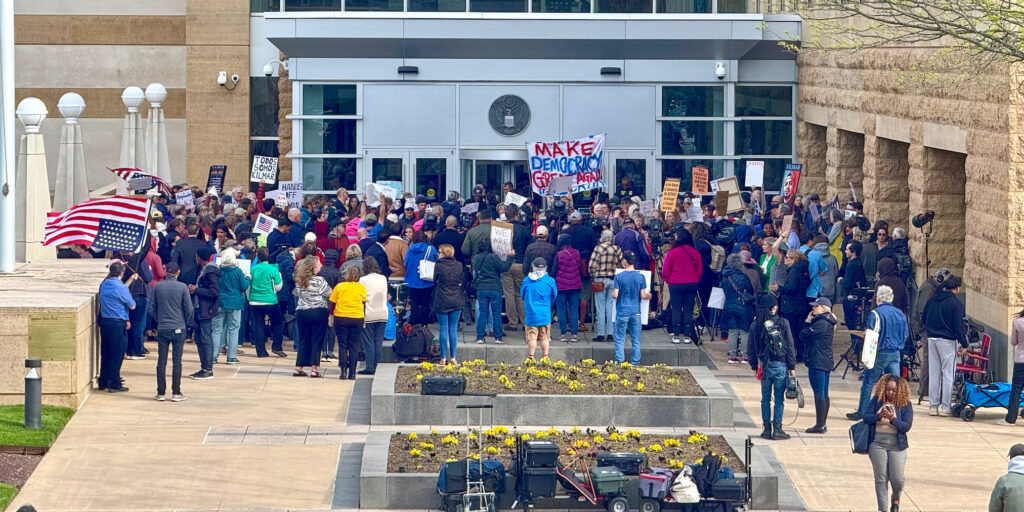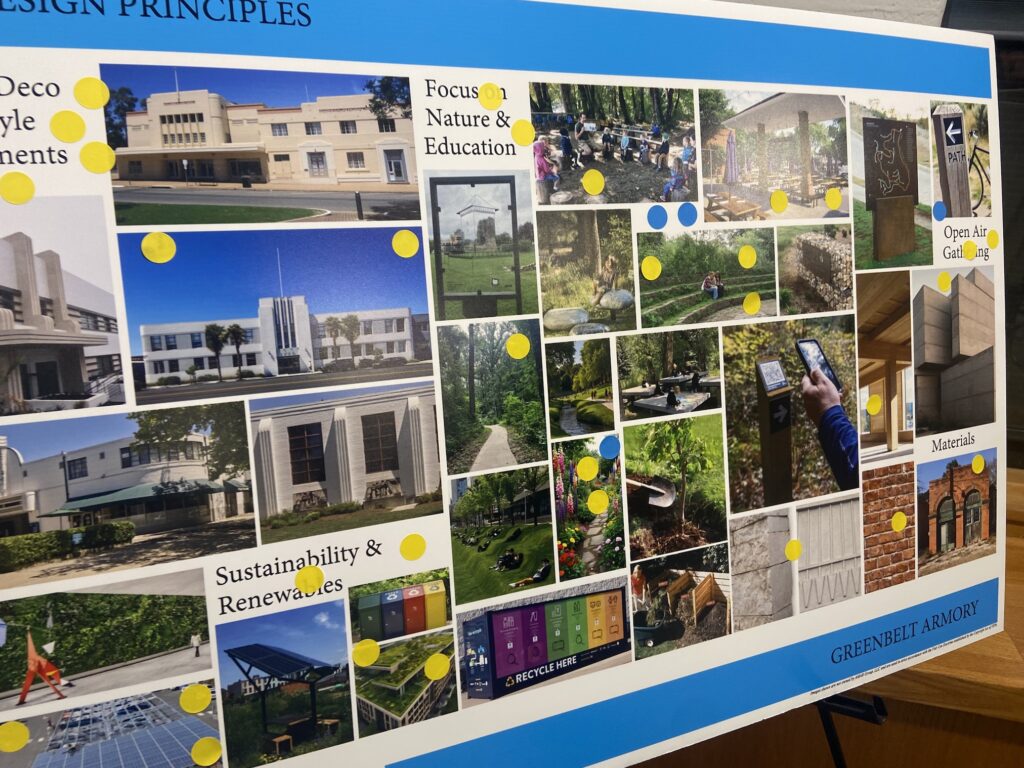On November 18, District 22 representatives to the Maryland General Assembly (House of Delegates Nicole Williams, Anne Healey and Ashanti Martinez and Senator Alonzo Washington) met in the Greenbelt Library to discuss priorities for the next legislative session with interested residents. An article in the Greenbelt News Review on November 23 covered the transportation issues that were a primary focus of the meeting; this article will concentrate on justice issues, another key topic raised.
Juvenile Crime, Carjackings
Resident and former councilmember Judith Davis noted the increasing carjackings and car vandalism in Greenbelt and other communities. Juveniles are charged with these crimes and then released to commit the crime again as a “revolving door” when the police find the same juveniles committing the same crimes.
Williams responded that she and the other state legislators have been contacted by many police departments over this issue. The FBI statistics on crime cite juvenile crime as 11 percent of all crimes committed nationwide. Williams has been requesting from police departments numbers on how often repeat offenders have been arrested and what the process is to provide counsel and services to the offenders. Juveniles under the age of 13 cannot go into the Department of Juvenile Services. Those under the age of 13 and other repeat offenders may have other needs and issues that are best addressed by the Department of Human Services by filing a report (children in need of assistance).
Juvenile Interrogation, Diversion
Greenbelt resident Louise Weissman asked what long-term solutions are being considered to address the recent spike in crime. In response, Williams spoke about the Juvenile Justice Reform Act from the Maryland General Assembly (SB 691), in effect for about a year, which requires police to notify the guardian of any juvenile in custody before interrogating them and also to provide the right to counsel. The Juvenile Justice Reform Act of 2022 impacted interrogation of juveniles and restricted the use of detention and confinement, shortened probation periods and encouraged diversions from court.
Some in law enforcement feel that the law requiring them to wait for a parent ties their hands from interrogation and the restrictions on their detention prevent them from keeping juveniles in custody. This is proving problematic, particularly amid a spike in juvenile crimes. Proponents of the change, however, have noted that youth are particularly susceptible to giving false confessions under interrogation. The bill also had a racial equity impact note that included data that juveniles under 13 who identified as Black or African American were almost four times likelier to have a Department of Juvenile Services (DJS) intake case when compared to whites, and the same group was almost 14 times more likely to have a DJS placement in custody or another committed program than whites.
Williams noted juveniles have the same right to counsel as adults, including the right to waive counsel. She said police are still able to investigate, as they have been doing with witnesses. Despite public backlash against the bill, Williams does not foresee its repeal.
Charging Juveniles as Juveniles
Weissman asked about a bill that was not passed last session related to charging juveniles as adults and placing them in adult jails. As the law stands now, a juvenile under the age of 18 may be charged as an adult and the prosecution would have to file a motion asking the court to charge the juvenile as a juvenile. The bill in question would reverse the process, charging the juvenile as a juvenile and placing the onus on the prosecution to file a motion to charge as an adult. Williams thinks the bill will be reintroduced this session. She noted concerns that DJS has been underfunded and unable to provide effective programs for rehabilitating the juvenile population. The hope is those programs will be funded.
Fines and Fees
The other juvenile justice issue raised at the meeting concerned fines and fees. Offenders who are on parole or probation have fees that are sometimes costly, for things such as drug testing. Without a job, some fail to pay for frequent testing and thus have unsatisfactorily completed their parole.
Unit Rule
Williams will be introducing legislation around the unit rule. Currently in Maryland, criminal records with charges that did not result in a conviction are eligible for expungement, but only if all charges within a “unit” are eligible. Thus, for example, if a person is charged with multiple crimes, some serious and some misdemeanors, even if they were only convicted of the misdemeanors, they would not be able to expunge their record after completing any time and parole because they’d be linked to the more serious charges (not necessarily convictions), which are not expungable. The bill Williams is introducing is not increasing the types of crimes that are expungable but allowing expungable crimes to be removed from a record even if they were within a unit with non-expungable charges.
A member of the audience, who asked not to be named, raised concerns about the impact of Williams’s proposal upon domestic violence cases. Williams stated that all non-expungable charges, like first degree rape, would remain non-expungable. In addition, the complete record and information about previous charges would still be available to the state prosecutors and law enforcement.
Protecting Judges
Williams, who sits on the Judiciary Committee, spoke about House Bill (HB) 536, a bill designed to protect the privacy of judges and their families by keeping their information private. The murder of Maryland State Judge Andrew Wilkinson outside his home in Hagerstown in October shocked the General Assembly and prompted action to protect judges from violence. The suspect in the murder is a man whose divorce and custody case went before the judge. HB 536 allows certain current and former judges and prosecutors and their immediate family members to request the removal of their personal information from the internet or other publications and to prohibit sharing of public records containing their home address or telephone number. Williams is confident that such a bill can be passed in the 2024 session.
Reproductive Justice
Jeff Brown, from the audience, questioned whether HB 705, a state constitutional amendment on reproductive freedom, would allow gender transitioning without parental support, as there were no age limits in the bill. Washington said he thought the constitutional amendment was about abortion as a woman’s right and that he felt this belonged in our state constitution. However, the interpretation of the bill as allowing gender transitioning with no age limit would have to be left to constitutional scholars and he could not comment on that interpretation.
Williams said her understanding is that the bill would be put on the ballot as a referendum for the voters. For Williams, the issue is not just about abortion but reproductive justice. The choices families make may involve when to have children with a healthy pregnancy and how to bring them into a healthy environment. Williams said she thought the issue of gender transitioning was called gender-affirming care and there is legislation that has been introduced with regards to this that is separate from HB 705.
Martinez pointed out that this constitutional amendment is about families, parents and those involved in the care of children having the ability to make choices responsibly for those children. The bill does not meddle in the doctor’s office regarding gender-affirming care.
Family Support
Greenbelt resident Erica Hernandez spoke about a bill to collect student parenting status information by Maryland’s institutions of higher education. Nationally, one in five students in higher education is a parent so, in addition to paying tuition and other educational costs, these students are paying for child-care and providing for their children. The bill will collect student parenting information and report it to the Maryland Higher Education Commission for tracking student retention and graduation rates. Then, hopefully, this information will lead to more financial support for working people with children who are pursuing higher education.
Healey responded that she would support such a bill and, in fact, that she introduced a similar bill codifying Title 9 for pregnant and parenting students so that these students have an opportunity to continue their education.
Scholarship Program
Martinez presented the District 22 scholarship program that funds requests from $200 up (with no upper limit) for college, trade, graduate, professional and post-secondary programs in Maryland. The application is available online by contacting a District 22 Delegate.



